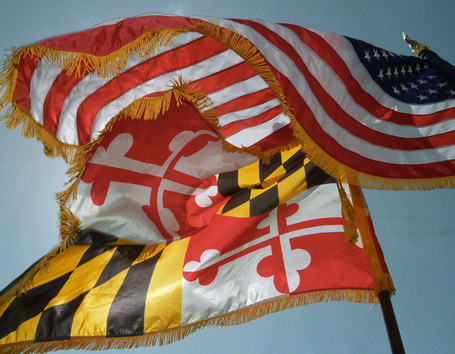As we head into the Labor Day weekend, a new rating is classifying Maryland as one of the 10 most pro-government union states in the country.
And that’s not a good thing, according to the Big Labor vs. Taxpayers Index released Wednesday by the Competitive Enterprise Institute, a Washington think tank that supports free markets and opposes organized labor.
The institute calls the index “a tool to empower citizens to challenge these unions’ oversized political clout.”
The importance of unions representing teachers, state employees and health care workers in influencing Maryland’s political process is well-known.
The index shows Maryland ties with Delaware and Minnesota with a score of 10 out of a possible 40, and a ranking of 40th in the country.
The other states in the bottom 10, with lower scores than Maryland in rank order, are New York, Jersey, Pennsylvania, Connecticut, Illinois, New Mexico and Hawaii.
The index scored Maryland poorly on factors including the strength of collective bargaining agreements, compulsory union dues, binding arbitration, construction contracts favoring union wages, lack of laws requiring secret ballots for union representation, secret negotiations on contracts and lack of a right-to-work law.
Maryland only scored well on union density – having a low proportion of union members in the state – anti-strike provisions for public employees, and on funding of its state pension liabilities.
The score on pension liabilities was surprising since it was based on 2009 data, before the changes in the public pensions this year that increased contributions and reduced future benefits.
Maryland was in the bottom 25% of states in future pension liabilities, although it was hardly small. According to a June study by two university finance professors, full funding of the pensions promised to Maryland teachers and employees would cost every household $818 a year – but many other states with lower average incomes owe much more.
CEI’s Labor Policy Counsel F. Vincent Vernuccio, who oversaw the project, was “not surprised” at Maryland’s overall score – “no offense,” he said.
But he was surprised that Virginia was not in the top five of the most anti-labor and pro-taxpayer states in the nation. It ranked 11th with a score 25. Virginia lost points for failing to legally protect secret ballots for union representation and for permitting labor union wages on public construction projects, such as the Dulles Metro project.
Vernuccio was also surprised that California ranked 36th in the nation with a score of 12, and not along with Maryland in the bottom 10. He said California achieved that by banning the kind of compulsory union dues Maryland put in place this year.
The CEI index, in partnership with Crossroads GPS, was previewed at the State Policy Network annual conference last week in Seattle. It reflects a new push by state-based free-market think tanks to challenge collective bargaining rights of public employee unions and their political power.
—Len Lazarick
Len@MarylandReporter.com






As someone over 65 working every “job opportunity” I’m offered – while paying gas taxes, sales taxes, utility taxes, community organization assessments, property taxes and some income taxes … much of which goes to the salaries and benefits of federal, state and local employees … with a substantial feed to unions (to morph into political contributions against my interests) … I find the information enlightens and further confirms my conclusions. As a federal employee I always wondered why we were payed so much more than the private sector that actually funded our existence. As a private sector employee I find the load crushes and much of my tax moneys go for “investments” and “causes” I oppose, I appreciate the contributions organizations and individuals such as CEI and others make with their insightful investigations. Thank you for your reporting!
I am proud to be a member of a union and I am thankful for the benefits that union has secured me. I chose my career, in part, because of the benefits I was guaranteed. Eight years of college had to be completed for me to acquire the proper certificates to get and maintain my job. I earn my pension and my benefits everyday that I work. Instead of bashing the unions and screaming that those who have earned those benefits should have them taken away, you should be demanding that you are treated better by your employer. In the end you had the same opportunity as I did to join a union driven work force; you chose not to. I am glad that Maryland stands up for its workers. Stop trying to scare people with the implied misconception that unions are bleeding the states dry. Have the people who can pay into the system actually pay their fair share.
Why did you choose to highlight the clearly biased views of a group that is admittedly “anti-labor” on this Labor Day weekend? In the interest of balance and fairness, will you spend as much time and space to highlight reports by “pro-labor” groups that disagree with the Wisconsin-type, business-led war against public employees? Your rightward leanings are showing, again.
This is great news. I am proud of Maryland. Maryland and the other top 10 states generally have high incomes, great higher education and cultural institutions, and good overall quality of life. That’s partly because they promote strong protections for workers and look for employers offering high-skill, family-supporting jobs, rather than cultivate the type of employer who is just looking for the cheapest state. This should actually be called the “labor versus sweatshop” index.
Great news if you are in a public sector union with a 29.1% representation, as opposed to a 6.1% private sector union membership according to the study. Given our reliance on government jobs & contracts, when the cuts come they will be devastating to the quality of life you enjoy. Equating non-unionized labor with sweatshops while glorifying unionized labor isn’t reality either. It’s just more of the “us vs.them” mentality that has gotten us into this deficit mess.